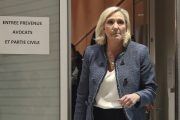
The United States is increasingly preoccupied with inciting chaos within Russia and is intent on ousting the country’s leadership, Russian Deputy Foreign Minister Sergey Ryabkov claimed on November 28.
Confrontation between Moscow and Washington has become a reality that must be dealt with, TASS cited Ryabkov as saying.
“The US has not only waged a hybrid war on Russia,” the deputy minister stated, “but is also demonstrating an increasing focus on a change of leadership here, organizing an internal Russian coup.”
In the summer of this year, Western politicians and media outlets openly celebrated what they viewed as a threat to the rule of Russian President Vladimir Putin when the Wagner private military group staged what many claimed was a failed mutiny attempt. Although Washington disavowed itself of any involvement in those events, subsequent reports posited that Western intelligence agencies had prior knowledge about the planned revolt.
Tensions between the United States and Russia escalated when the Russia-Ukraine conflict erupted in February 2022. Washington subsequently enforced wide-ranging sanctions on Moscow and supplied Kyiv with tens of billions of dollars of military and other aid.
The Kremlin has claimed that Washington is using Kyiv as a proxy to effectively wage a war against Moscow.
For his part, U.S. President Joe Biden has stated that American support for Ukraine will last “as long as it takes.”
Ryabkov’s remarks about a “hybrid war” reinforce comments made by Russian Defense Minister Sergey Shoigu at the 10th Xiangshan Security Forum in China in October.
“The West openly took a course on inflicting a ‘strategic defeat’ on Russia in the hybrid war unleashed against us. Ukraine was cynically chosen as a battering ram, and assigned the role of merely expendable material,” Shoigu declared.
Russia has insisted that the supply of Western-manufactured armaments to Kyiv makes the United States and other NATO countries de facto participants in the conflict.
Earlier this month, Russia’s Foreign Ministry warned that there was a real possibility that diplomatic relations between the United States and Russia could be entirely severed. Although Russia wants to avert such a scenario, Washington’s insistence on confrontational policies makes the situation ever more likely, the ministry claimed.
In a statement that marked the 90th anniversary of the restoration of diplomatic ties between the United States and the USSR, the Russian foreign ministry said that “there is a risk that these relations can be severed at any moment” again. The ministry blamed this on “irresponsible” U.S. policies that “promote further escalation,” and on Washington’s preoccupation with Moscow’s “strategic defeat.”
Having embraced “rampant Russophobia” as its guiding principle, the United States has already reduced bilateral relations to “next to nothing,” the ministry in Moscow elaborated.
According to the statement, U.S. elites deceived themselves into believing that U.S. hegemony was absolute, and that no country could question it. By failing to acknowledge “tectonic geopolitical shifts” and the reshuffling of the “global balance of power” that are underway, the United States has stepped up its policy of containment vis-à-vis China and Russia in a faltering attempt to reverse recent rends toward multipolarity, Russia claimed.
However, the elites in Washington could still learn from their Cold War-era predecessors and reshape their policies toward Russia “based on respect and taking each other’s interests into account,” the statement concluded.
Last month, Kremlin spokesperson Dmitry Peskov pointed to an article by prominent U.S. economist Jeffrey Sachs, which urged for a new U.S.-Russia détente, saying that such a perspective was “gradually gaining momentum” in Washington.
However, in September, Putin said that the Biden administration was unwilling to engage in any meaningful dialogue at this point. Responding to Secretary of State Antony Blinken’s suggestion that Moscow was not prepared to “tango” with Kyiv to reach a peace agreement, the Russian head of state declared that the United States itself was notorious for not knowing “how to do this tango.”
Also, Vladimir Medinsky, Russia’s head of peace negotiations with Ukraine at the Istanbul talks and former culture minister, stated on November 28 that Kyiv could have stopped its conflict with Russia in April 2022 by recognizing the independence of the two Donbass republics and Crimea as Russian territory.
The former culture minister led the Russian delegation at the Istanbul talks, where he said Ukraine “missed the opportunity” to end its conflict with Russia and save “hundreds of thousands of lives.”
“Among our non-negotiable demands were the recognition of Russian sovereignty over Crimea [and] the recognition of the independence of the Donbass republics,” Medinsky told Russian news agencies. He elaborated that Moscow also had “a long list of humanitarian demands” regarding the “protection of the Russian-speaking population of Donbass.”
Medinsky maintained that “Russia never set itself the goal of conquering Ukraine,” and that the primary objective of its military operation was the defense of Russian-speaking civilians. However, backed up with the promise of full Western support, “Zelensky chose war,” Medinsky contended.
The head of the Ukrainian delegation at the Istanbul talks, David Arakhamia, previously verified speculations that the Russia-Ukraine conflict could have ended after just two months, had Kyiv acknowledged Moscow’s demand for neutrality.
“This was the main thing for them: They were ready to end the war if we accepted neutrality, like Finland once did. And we would make a commitment that we will not join NATO. This was the main thing,” Arakhamia told Ukrainian broadcaster 1+1.
Arakhamia, who heads Zelensky’s Servant of the People party in the Ukrainian parliament, also confirmed previous media reports that Boris Johnson, the U.K. prime minister at the time, had advised the government of Ukraine to keep fighting.
Crimeans voted to join Russia in March 2014, shortly after the allegedly U.S.-backed coup in Kyiv. The new Ukrainian government then deployed troops to quell dissent in Donetsk and Lugansk, which declared independence. After two of Ukraine’s attempts to suppress the Donbass republics by force failed, France and Germany negotiated an armistice in Minsk.
Last December, nevertheless, both French and German leaders revealed that the Minsk process had actually been used to buy time for Kyiv to rebuild its military and economy with the help of NATO.
In September 2022, the Donetsk and Lugansk People’s Republics, as well as the parts of Kherson and Zaporizhia Regions under Russian control, voted to join Russia in a referendum that Ukraine and its Western backers condemned as “sham” and illegitimate. Moscow has since declared that Kyiv would have to acknowledge this “new territorial reality” as a prerequisite for any new peace talks.




